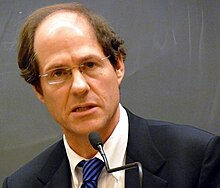Do you think that this is a profound statement? "Intention and attention are mystery's manifestation."
What about this one? "Hidden meanings transform unseen beauty."
Both statements are, of course, nonsense, understood in a particular sense: not a lie, but a kind of verbal smokescreen, designed to suggest depth and insight but actually vague, vacuous or meaningless. As we'll see, an understanding of pretentious-sounding gibberish and its frequent power tells us something important about contemporary politics. But we need a little social science first.
Gordon Pennycook, a psychologist at the University of Waterloo in Ontario, recently led a team of researchers in an investigation of how people react to "pseudo-profound" nonsense. As an initial test, they presented 280 undergraduates with 10 sentences that consisted, like the two sentences above, of vague, randomly chosen buzzwords.
The researchers asked students to use a 5-point scale to rate the profoundness of each statement, defined as "of deep meaning" (which was, of course, entirely absent from all of them). On the scale, 1 meant "not profound at all," 2 meant "somewhat profound," 3 meant "fairly profound," 4 meant "definitely profound," and 5 meant "very profound."
The average rating was 2.6, meaning that most people agreed that randomly chosen buzzwords were closest to "fairly profound." In a follow-up study, some people were even willing to say that completely vacuous statements -- such as "Most people enjoy at least some sort of music" -- were at least somewhat profound.
Pennycook and his colleagues also investigated the individual characteristics that lead people to regard baloney as profound. Not surprisingly, they found that people are more receptive to it if they do less well on measures of analytical thinking, such as numeracy and verbal intelligence. They also found that people are more open to this stuff if they also hold paranormal beliefs, endorse alternative medicine or accept conspiracy theories.
These results are not simply a measure of the piffle radars of Canadian undergraduates. In its various forms, the same kind of thing can be readily found in academic circles, especially in the humanities. From the influential French theorist Jacques Derrida: "Surviving -- that is the other name of a mourning whose possibility is never to be awaited." From the even more influential Michel Foucault: "Death left its old tragic heaven and became the lyrical core of man: his invisible truth, his visible secret."
But as Pennycook and his colleagues note, some kinds of nonsense are also common in the political domain, usually in the form not of pseudo-profundity, but of ambiguity or vagueness.
The paper downplays an important reason for the effectiveness of this kind of thing, which is how it makes people feel. Pseudo-profound statements work when they make people feel that they are being given access to a deep secret: They produce a kind of awe, even reverence, and so it's all the better if the meaning of those statements is unclear. When it is effective, political baloney makes people feel that they are listening to someone firm, confident and strong. The vagueness of the statement isn't a problem; what matters is the favorable emotion that it produces.
In academic life or in politics, the problem with this stuff is the same: It doesn't treat people with respect. It's a lot like a lie; it's certainly a form of manipulation. Sometimes it works, in which case voters can be taken in, at least for a while. But they deserve better than that, and in the end, majorities tend to demand it.
Whether or not that's so, one thing remains quite clear: A good column is like a silent breeze on the mountain's sightless peak. It does not ebb; it saunters.
Previously:
• 08/31/15: The new Dem catchphrase is a lie
Comment by clicking here.
Cass R. Sunstein, the former administrator of the White House Office of Information and Regulatory Affairs, is the Robert Walmsley university professor at Harvard Law School and a Bloomberg View columnist.



 Contact The Editor
Contact The Editor
 Articles By This Author
Articles By This Author